
[ad_1]
We don’t want to see an AI ‘Hiroshima,’ Salesforce CEO says
Marc Benioff, co-founder, chairman and CEO Salesforce, speaking with CNBC’s Sara Eisen at the World Economic Forum Annual Meeting in Davos, Switzerland on Jan. 17th, 2024.
Adam Galici | CNBC
The tech industry is setting down safety protocols and establishing trust principles in relation to the developing AI software that has taken the world by storm to avoid a “Hiroshima moment,” Salesforce CEO Marc Benioff told a World Economic Forum panel in Davos, Switzerland.
“This is a huge moment for AI. AI took a huge leap forward in the last year or two years,” he noted, acknowledging that, amid the rapid pace of its progress, the technology “could go really wrong.”
Concerns have mounted over the trustworthiness and uses of AI, with critics worldwide raising questions over the software coming to replace human workers. Earlier this week, the International Monetary Fund released a report that warned that nearly 40% of jobs across the globe could be impacted by the rise of artificial intelligence.
“We don’t want something to go really wrong. That’s why we’re going to, like, that safety summit. That’s why we’re talking about trust,” Benioff said Thursday. “We don’t want to have a Hiroshima moment. We’ve seen technology go really wrong, and we saw a Hiroshima. We don’t want to see an AI Hiroshima. We want to make sure that we’ve got our head around this now.”
Salesforce has skin in the game after launching its own generative AI software Einstein GPT and joining a global race among software developers to incorporate generative AI capabilities into their existing products.
— Ruxandra Iordache
Red Sea attacks weighing on WTO goods trade sentiment, organization’s chief says
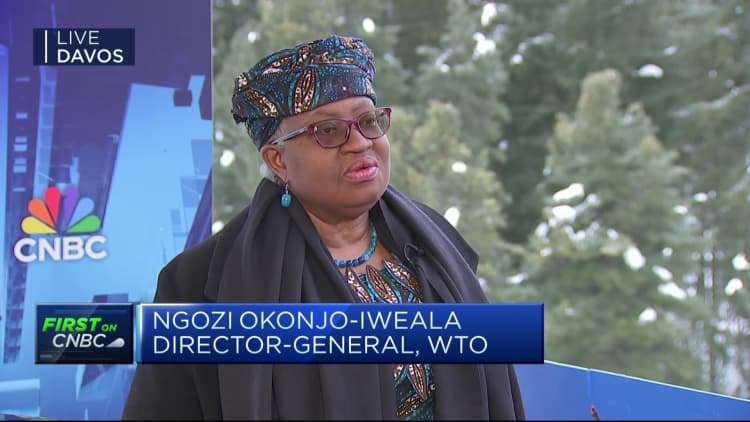
Ngozi Okonjo-Iweala, director general of the World Trade Organization (WTO), told CNBC that attacks on vessels in the Red Sea had made the body “slightly less optimistic” on its goods trade forecast for 2024.
The Houthis, an Iran-backed militia group, have been attacking vessels in the region since November, causing many ships to re-route.
“The fact that container shipping has had to divert and the higher costs are weighing on our sentiment with respect to what will happen with goods trade this year,” she said, speaking at the World Trade Forum in Davos, Switzerland.
In October, the WTO projected 3.3% trade growth for this year, up from an expected growth of 0.8% in 2023.
Okonjo-Iweala said the “prospect of maybe a wider spread of the conflict is also very concerning.” She added that the downgrading of global GDP (gross domestic product) forecasts also impacted trade because it “hits aggregate demand all around.”
Despite the disruption in the Red Sea, Okonjo-Iweala said the WTO still expected trade growth numbers to be better this year than in 2023.
— Vicky McKeever
Israel-Saudi normalization ‘key to the ability to exit from the war into a new horizon’: Israeli president
Israeli President Isaac Herzog gestures as he sits next to a photograph showing 10-month-old baby Kfir Bibas held by Hamas during a session of the World Economic Forum (WEF) meeting in Davos on January 18, 2024.
Fabrice Coffrini | Afp | Getty Images
Normalizing relations with Middle East heavyweight Saudi Arabia is pivotal for Israel to transition from the current war against Palestinian militant group Hamas toward new opportunities, Israel’s president said.
“Clearly, the Saudi option, as part of it, of the whole normalization process is key to the ability to exit from the war into a new horizon,” Isaac Herzog said in a special address at the World Economic Forum in Davos, Switzerland. “It’s still delicate, it’s fragile, it will take a long time, but I think it’s actually an opportunity to move forward in the region toward a better future. I view that as a very important development.”
He went on to describe normalization with Saudi Arabia — a step that has been heavily encouraged by the U.S. in a bid to reunite its two strong allies in the Middle East — as a “game-changer,” saying that Riyadh’s steps to recognize Israel would follow on “the courage of nations, such as Egypt, Jordan and the Abraham Accords nations such as the United Arab Emirates, Morocco, the kingdom of Morocco, and the kingdom of Bahrain.”
Saudi Arabia has so far withheld its approval from normalizing relations and has historically aligned itself with the interests of the Palestinian people in the Gaza Strip.
Israel’s Prime Minister Benjamin Netanyahu had indicated to the U.N. that his country was “at the cusp” of a breakthrough leading to a peace deal with Riyadh in September last year, a mere two weeks before the Oct. 7 Hamas terror attacks plunged Israel into war. Saudi Arabia has since called for a cease-fire in the Gaza Strip, where Israel is carrying out a retaliatory offensive.
In January, Saudi ambassador to the U.K., Prince Khalid bin Bandar, told the BBC that his country remains interested in normalizing ties with Israel after the end of the war in the Gaza Strip, but stressed that any agreement hinges on the creation of a Palestinian state.
— Ruxandra Iordache
Israelis want to be ‘promised real safety in the future,’ president says
Israelis want certainty over their future safety, said Israel’s President Isaac Herzog.
“If you ask an average Israeli now about his mental or her mental state, nobody in his right mind is willing now to think about what will be the solution of the peace agreements, because everybody wants to know: Can we be promised real safety in the future?” he said, speaking in an address at the World Economic Forum in Davos, Switzerland.
“Every Israeli wants to know that he will not be attacked in the same way from north, or south, or east,” he added, referring to the attacks by Palestinian militant group Hamas on southern Israel on Oct. 7.
— Lucy Handley
‘If Israel were not there, Europe would be next,’ Israeli president says
Israeli President Isaac Herzog warned that Israel is holding back threats in the Middle East that would otherwise spread to menace Europe and the United States.
Addressing Israel’s ongoing war against Palestinian militant group Hamas and Lebanese faction Hezbollah, he said, “If Israel were not there, Europe would be next … and the United States is next too.”
Herzog was speaking in an address at the World Economic Forum in Davos, Switzerland.
“We are fighting a war for the entire universe, for the free world,” he added, also referencing the threat of Lebanese militant faction Hezbollah, which has been engaging in offensives with Israel since the start of the conflict, citing solidarity with the civilians of the Gaza Strip.
He also acknowledged the naval dangers in the Red Sea posed by Yemeni Houthi, saying that Israel is “unraveling a huge system of evil.”
— Ruxandra Iordache
Israel’s president calls on world to work toward hostage release
Isaac Herzog, Israel’s president.
Bloomberg | Bloomberg | Getty Images
Israeli President Isaac Herzog has called for the release of the 136 hostages held by Hamas.
Addressing delegates at the World Economic Forum in Davos, Switzerland, Herzog spoke of a baby boy, Kfir Bibas, who turned one year-old on Thursday while kidnapped by Hamas.
“Here, on this incredible world stage, I call on the entire universe to free Kfir Bibas and all the hostages that are there,” he said, sitting next to a photograph of the baby.
“Our world was shattered on [the] 7th [of] October, we were celebrating a Jewish holiday … we were awakened into a huge shock,” Herzog said, describing Hamas’s attack against Israel last year.
— Lucy Handley
‘We need to be much faster’: European Commission vice-president on supporting business
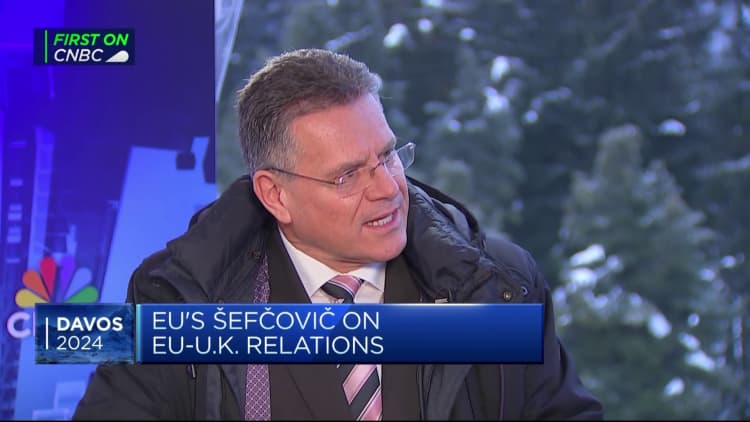
European Commission Vice President Maros Sefcovic said the organization must “adjust how we are supporting our businesses in Europe” by smoothening the process of granting permits, among other measures.
Asked how Europe will respond to competition from the U.S and China — the U.S. has invested billions of dollars into climate change technology and infrastructure, while China’s BYD has become the world’s top electric vehicle (EV) maker — Sefcovic said that the Commission is “ready to fight” for European businesses.
“We want you to prosper in Europe, because we have a lot to offer, we just have to be much faster, we have to be better at scaling up. And of course we have to do our utmost to make sure that sustainability, which is a trademark feature of European economies, will have a future here in Europe,” he told CNBC at the World Economic Forum in Davos, Switzerland.
The European government and national governments must provide a “one-stop shop” to support businesses financially, Sefcovic added.
— Lucy Handley
‘Europe is lagging behind’ on innovation, says Merck KGaA CEO
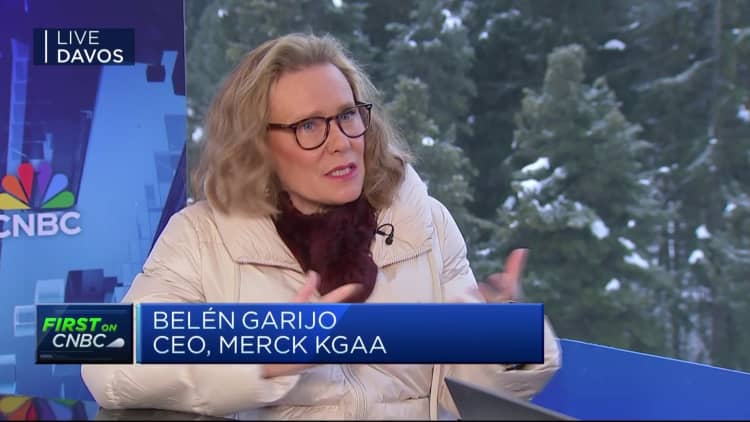
Belén Garijo, CEO of the multinational science and technology company Merck KGaA, says innovation is key to economic growth and prosperity and at this time “I believe Europe is lagging behind.”
Great power rivalries could derail the energy transition, professor says
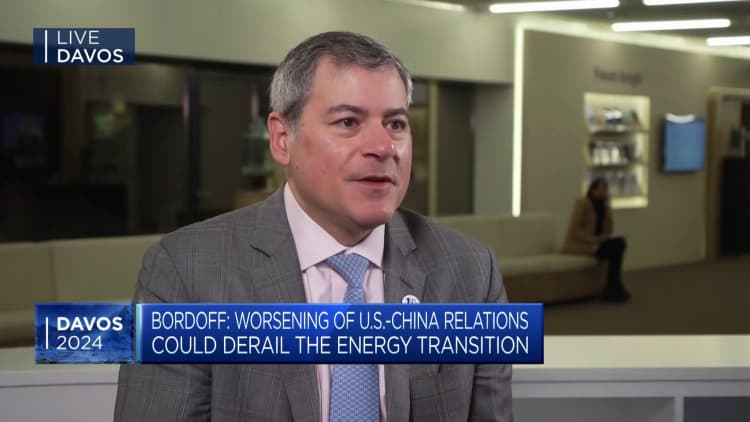
Jason Bordoff, the founding director of the Center on Global Energy Policy at Columbia University, discusses how elections throughout the world in 2024 might affect climate policy and what needs to be done to speed up the energy transition.
Barclays CEO: ‘I’m very optimistic on the UK’
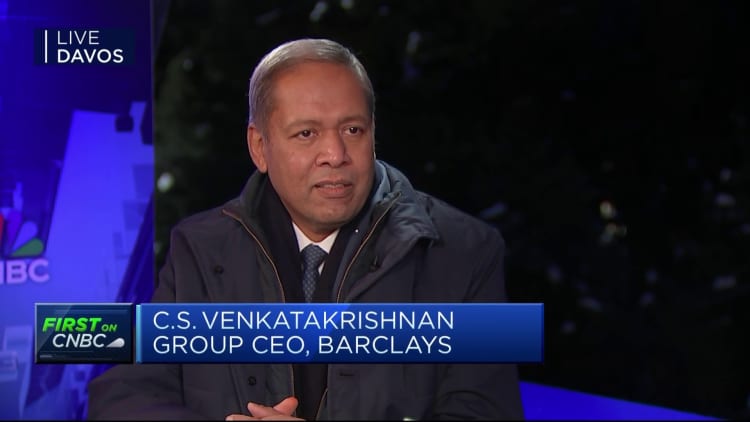
Barclays CEO C.S. Venkatakrishnan said he is “very optimistic” about the outlook for the U.K. economy, speaking to CNBC at the World Economic Forum in Davos, Switzerland.
“I think the U.K. consumer is in very decent shape … These pent-up savings have been getting eroded. On the other hand, it’s a floating rate mortgage market, and a lot of the mortgage adjustment has happened, because the average term is about three years fixed and we’ve had about three years of rising rates,” he said.
The typical products on offer to U.K. consumers are two-year and five-year mortgages.
“Energy prices have calmed down. So the two things that have hit the pocket book are coming down, and I will say I’m very optimistic on the U.K.,” he added.
— Lucy Handley
‘There’s a lot of errors’: CEOs discuss generative AI
Companies touting their artificial intelligence products dominated the Promenade, the main road in Davos. In past years at the World Economic Forum annual meeting, cryptocurrency firms were the most prominent down the Promenade. But AI fever has taken over in 2024.
Arjun Kharpal | CNBC
The rise of generative artificial intelligence (AI) has dominated public and private discussions at the World Economic Forum in Davos, Switzerland.
Accuracy was a key topic for technology leaders, with Intel‘s CEO Patrick Gelsinger telling CNBC: “How do you prove that a large language model is actually right? There’s a lot of errors today. So you still need, you know, essentially, I’m improving the productivity of a knowledge worker. But, at the end of the day, I need the knowledge worker to say is it right.”
The best way to improve accuracy is through experimentation and co-piloting tests to advance adoption, said Clara Shih, CEO of Salesforce AI.
“You can tell the AI to be conservative for higher stakes until a human co-pilot essentially graduates it to autopilot,” Shih said.
— Lucy Handley
Emmanuel Macron: We must be ‘more visible’ as Europeans during ‘pivotal year’
France’s President Emmanuel Macron delivers remarks, during the 54th annual meeting of the World Economic Forum, in Davos, Switzerland, January 17, 2024.
Denis Balibouse | Reuters
Europe must be more assertive on the world stage, according to French President Emmanuel Macron who spoke at the World Economic Forum in Davos, Switzerland, on Wednesday.
“2024 will be a pivotal year for Europeans. We must prove that we can be more visible, make more efforts, whatever happens in the United States,” he said at the event, according to a translation.
Macron also voiced concern about what the outcome of the year-end presidential election could mean for existing tensions between the U.S. and China.
“The great risk for Europeans is that they would end up with the wrong agenda,” he said.
— Lucy Handley
Centrist parties need to better articulate key issues, Dutch Prime Minister says
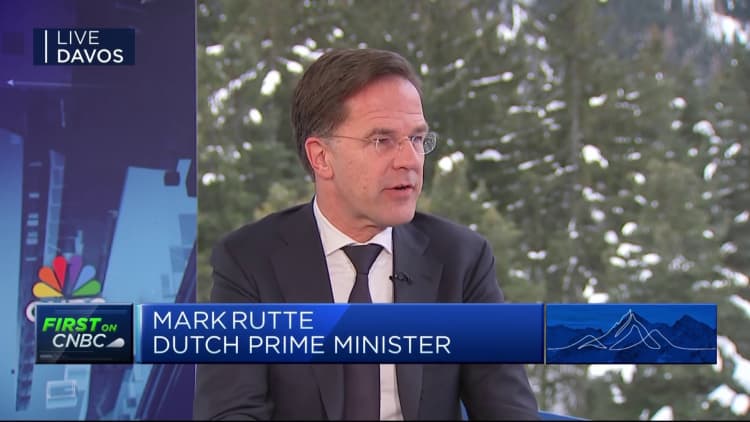
Dutch Prime Minister Mark Rutte told CNBC that centrist political parties need to better articulate their position on key issues.
“I think the centrist parties, like my party, right of center, have to be more successful — me myself, my party — to explain we are there for the economy, we are there for collective safety,” he said at the World Economic Forum in Davos, Switzerland.
He added that this means “you need strong nation states but also strong multilateral organizations, and the more right-wing parties are successfully challenging particularly that multilateral world order.”
Mark Rutte has served as Netherlands’ prime minister since 2010. However, a general election in November saw Geert Wilders’ far-right Freedom Party secure a decisive victory, with talks underway to form a new coalition government.
— Vicky McKeever
Read CNBC’s previous live Davos coverage
[ad_2]
Source link